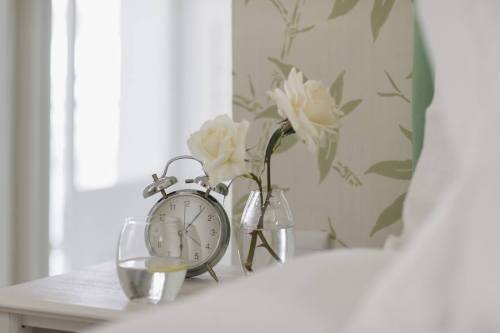Why high-functioning people fail to do simple chores…like clean filthy water cups in the bedroom
Ever have dirty water cups pilie up in your bedroom? Here, a psych explains nonurgent chores are often left undone thanks to our way of prioritizing tasks.

“I’ve had water glasses on my nightstand longer than Justin Bieber and Hailey Baldwin have been married,” I thought to myself during my last session of anxiety-induced cleaning. During that purge of all the drinks in my room that I neither bothered to finish nor take to the sink to clean, I found one cup with brown fluid in it (it was not coffee, tea, or soda, friends), while another held what I can only assume to be mold.
What is wrong with us me? Why do I hoard glasses by my bed instead of taking 30 seconds to wash them, or even 15 seconds to leave them in the kitchen sink indefinitely? Ultimately, and pretty obviously, this doesn’t happen because cleaning them is hard to do. Rather, the problem is that it’s such an easy chore that when it comes to prioritizing tasks, things like this fall hard in the “nonurgent” camp.
“While it may seem like an impossible feat to do simple tasks like empty the dishwasher or move the cup of water next to our bed, it’s not a lack of awareness, but rather a low-risk choice,” says psychotherapist Jennifer Silvershein, LCSW. “In any given moment, there are a copious amount of tasks and achievements we must make to keep our life moving. While the dishes are piling up, and we know that it seems easy to clean them and put them away, there really is no harm—and therefore, no urgency—in not getting the task done when we have 10 work emails that need to be answered ASAP.”
“While the dishes are piling up, and we know that it seems easy to clean them and put them away, there really is no harm in not getting the task done.” —psychotherapist Jennifer Silvershein, LCSW
Furthermore, because water is the most clear and innocuous of all drinks, it’s easy to not worry about the consequences of leaving it on our nightstand for, um, quite a few fortnights as the surface slowly but surely becomes a glass and mug graveyard.
“I like to view this as the A, B, and C to-do list,” Silvershein says. “Imagine the A to-do list is the urgent, time-sensitive items that are unplanned but seem to show up on an hourly basis. The B to-do list is the items that are recurrent and need to be done—think of these as end-of-day tasks. Dishes or moving the water cup next to the bed gets knocked to the C to-do list—aka, for ‘When I Have Free Time,’ which you’ll never find.” The reason for the cup buildup, she says, is because nothing on your C to-do list will have any immediate or obvious negative impact on your life if you don’t complete the tasks.
This is especially true for water glasses, because unlike leaving out, say, a half-full bowl of cereal from the morning, you’re not going to attract a Mouse Army by letting the cups hang. Nevertheless, taking a moment to breathe would keep the cups from piling up.
“Often, if we just woke up five minutes earlier and spent a little less timing rushing around or cramming in one final event into our day, these tasks would seem much simpler,” Silvershein says. “But when we’re already 30 minutes late before our day has started and need to fall asleep fast because we stayed out late, it’s no surprise that the small tasks go undone.”
Sure, there are worse things than keeping a cluttered nightstand (like, say, drinking from one of the filthy glasses). But if you had a long enough time to read this piece, then seriously, no excuses. Go take hose cups to a soapy sink, stat.
Trying to curb other bad habits? There’s a psychological reason to stop interrupting people. And some intel as to why we turn into monsters while waiting in line.
Sign Up for Our Daily Newsletter
Get all the latest in wellness, trends, food, fitness, beauty, and more delivered right to your inbox.
Got it, you've been added to our email list.








